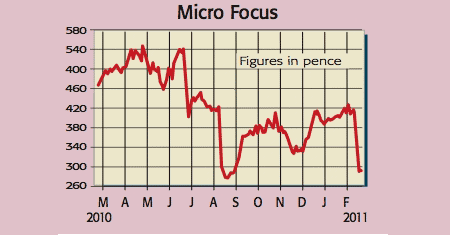
Last Tuesday there was a loud cheer from the corporate IT sector. Dell – the world’s second-biggest PC-maker – released results that knocked the socks off Wall Street estimates. MicroFocus, on the other hand, is not yet dancing to the same drum-beat of recovery. On the same day, it issued a shock profits warning – sending the stock down 25%. The main culprit? Licence fees in its Cobol practice (65% of sales), which were weaker than thought as a number of large deals were deferred or cancelled. The North American federal market was particularly weak. Clearly, this is disappointing. But if these problems can be fixed, there is a chance of a takeover at a rock-bottom valuation. What’s more, this seems likely to me.
Micro’s other division, which runs automated testing of software, is ticking along nicely. And despite the recent setback, long-term prospects for the Cobol unit – which helps businesses update legacy mainframe systems to run on new, cheaper hardware – are attractive. Although it is one of the oldest programming languages in existence, Cobol is still used in around 70% of the world’s businesses. For many banks, hospitals and retailers, these systems are extremely stable and reliable. So it would be far too difficult and expensive to simply rip them out and replace them with new technology (eg, SAP or Oracle). Better to ask Micro to upgrade, test and migrate them; perhaps on to Java, .Net or a cloud-based platform.
The other plus point is that much of the third-quarter sales disappointment seems to have stemmed from being out-flanked by the likes of IBM, and being behind-the-curve in terms of shifting the focus of its bids from ‘sweating assets’ to ‘driving the top line’. Dell prospered because it sold equipment that boosted client revenues. Micro, in contrast, did not react fast enough to re-orientate its efforts from helping customers cut costs to growing turnover. But all three of these issues are solvable with better sales execution, and in particular by deepening the pipeline.
MicroFocus (LSE: MCRO), rated a BUY by Numis Securities
These temporary air-pockets in demand will allow the board to rip out its own dead wood, and realign the firm’s cost base for the years ahead. CEO Nigel Clifford predicts that turnover for the year ending April 2011 will be in the range of $432m-$442m, with adjusted EBITDA coming in at $159m-$167m. Net cash will be positive.
On this basis I would value the group on an eight times multiple, generating a fair value of 395p per share. Naturally, there are risks, such as successfully delivering the restructuring plans, a weakening dollar and aggressive competition. Nonetheless, IT has become the lifeblood of the global economy, underpinning billions of transactions every day. In this environment, MicroFocus should flourish.
There is every chance the firm could also become the subject of a bid, given the woeful rating. Numis Securities has a price target of 428p.
Recommendation: BUY at 280p
• Paul Hill also writes a weekly share-tipping newsletter, Precision Guided Investments